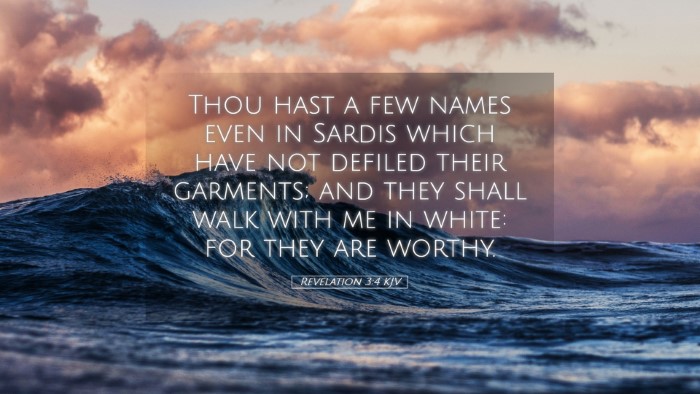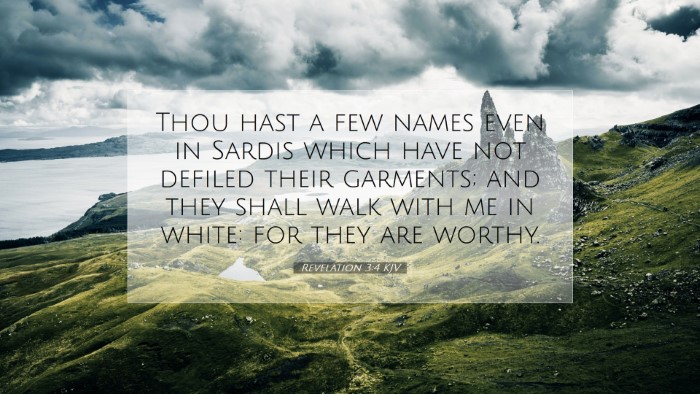Commentary on Revelation 3:4
Bible Verse: "Yet you have still a few names in Sardis, people who have not soiled their garments, and they will walk with me in white, for they are worthy."
Introduction
The letters to the seven churches, found in the Book of Revelation, convey profound truths about the spiritual state of those communities and, by extension, the broader Christian experience. The verse Revelation 3:4 specifically addresses the church in Sardis, highlighting both the condition of spiritual decay prevalent among many believers and the remnants of fidelity among a few. The following commentary seeks to distill insights from notable public domain theologians such as Matthew Henry, Albert Barnes, and Adam Clarke. It aims to elucidate the rich theological and practical implications of this verse for contemporary readers.
Contextual Overview
The church in Sardis, once praised for its vitality, had become complacent, characterized by a false sense of security regarding its spiritual state. This epistle invites the church to recognize its spiritual lethargy and to return to a posture of vigilance and renewal.
Historical Background
Sardis was a prosperous city, known for its wealth and military power, yet it had a history of defeat due to its unguardedness. This backdrop serves as a metaphorical warning for the church regarding spiritual vigilance. As Matthew Henry notes, the affluence of Sardis mirrored the complacency in its church, which had become spiritually dead despite maintaining a façade of life.
The Message to Sardis
Against this context, the message of Revelation 3:4 focuses on the remnant that had not "soiled their garments." The phrase evokes imagery from the Old Testament, where garments symbolize purity and righteousness.
Analysis of Key Phrases
"Yet you have still a few names in Sardis"
Albert Barnes emphasizes the significance of the remnant concept throughout Scripture, illustrating God’s faithfulness to preserve a group of true believers within a larger community that has fallen into disfavor. This indicates hope amidst judgment, showing that God’s grace abounds even where sin seems to reign.
"People who have not soiled their garments"
The imagery of soiled garments suggests moral impurity and a departure from the holiness expected of God’s people. Adam Clarke interprets this to mean that these chosen ones have maintained their fidelity to Christ amid the surrounding corruption. This not only speaks to their spiritual integrity but also serves as an exhortation for others to pursue holiness.
"They will walk with me in white"
This promise reflects the intimate fellowship believers experience with Christ. Matthew Henry writes that "to walk with Him" entails sharing in His righteousness and glory. The 'white garments' symbolize purity, victory, and acceptance before God, representing a significant eschatological hope for faithful believers. It highlights not just a future promise but also the present reality of abiding in Christ’s righteousness.
Theological Implications
Grace and Perseverance
Revelation 3:4 offers insights into the doctrines of grace and perseverance. Despite the pervasive sin in the church of Sardis, God acknowledges those who remain faithful. This interplay illustrates the idea that grace is sufficient to sustain believers even in spiritually barren environments.
Judgment and Hope
The stark contrast between the 'few' who remain pure and the broader context of spiritual death provides a profound reminder of the eschatological themes of judgment and hope. As Albert Barnes points out, though judgment is imminent, God’s mercy prevails, providing assurance to those who strive to remain steadfast.
Practical Applications
- Call to Vigilance: This verse is a clarion call for believers to remain vigilant against complacency in their spiritual lives. Pastors and leaders must encourage their congregations to actively engage in spiritual disciplines that foster growth and accountability.
- Importance of Community: The presence of a faithful remnant underscores the importance of community and mutual encouragement among believers. Church leaders should foster environments where believers can support one another in living pure lives.
- Encouragement for the Faithful: For those who may feel alone in their commitment to Christ, this verse serves as encouragement that God sees and values their efforts, promising them a reward for their faithfulness.
Conclusion
Revelation 3:4 encapsulates essential truths about the nature of the church and individual believers amidst challenges. Insights from commentators like Matthew Henry, Albert Barnes, and Adam Clarke reinforce the need for holiness and vigilance in the life of every Christian. It invites both reflection and action—a call to live in faith and hold onto the hope that Christ offers to all who remain true to Him.


